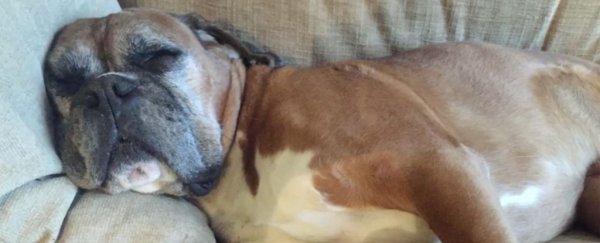A British couple whose dog passed away in June are about to become the first in the UK to clone a dead animal, and their two new puppies are expected to be born on Boxing Day.
Laura Jacques and Richard Remde from Yorkshire became aware of Sooam Biotech Research Foundation, a South Korean cloning company that performs private dog cloning services for approximately US$100,000 per canine, when their beloved boxer Dylan died of a heart attack after having been diagnosed with an inoperable brain tumour.
Despite the immense cost involved, Jacques, a dog walker, and her partner Remde decided to attempt the procedure, which involved flying to South Korea twice after an initial sample from Dylan's skin failed in the lab.
According to Diane Taylor at The Guardian, the cloning process involves implanting sampled DNA into a 'blank' dog egg that's had its nucleus removed. Once the new DNA is implanted into the egg, electric shocks are used to trigger cell division, and the egg is implanted into a surrogate female dog to give birth to the clones.
In this case, due to the delays stemming from the botched first sample, the second sample of Dylan's skin was taken some 12 days after the dog had passed away, setting a new record for the researchers at Sooam.
"This is the first case we have had where cells have been taken from a dead dog after a very long time," David Kim, one of the scientists involved, told Taylor. "Hopefully it will allow us to extend the time after death that we can take cells for cloning."
The organisation, which has successfully cloned more than 700 animals for private customers, provides explicit instructions on its website for those wishing to prepare their deceased animal for the cloning procedure.
"When your dog has passed away, DO NOT place the cadaver inside the freezer," the website explains. "1. Wrap the entire body with wet bathing towels. 2. Place it in the fridge (not the freezer) to keep it cool. * Please take into account that you have approximately five days to successfully extract and secure live cells."
While there are currently no regulations prohibiting the cloning of pets, the practise, which is still very new, remains controversial.
"There are serious ethical and welfare concerns relating to the application of cloning technology to animals," a spokesperson for the RSPCA told The Guardian. "Cloning animals requires procedures that cause pain and distress, with extremely high failure and mortality rates. There is also a body of evidence that cloned animals frequently suffer physical ailments such as tumours, pneumonia and abnormal growth patterns."
But these concerns weren't enough to sway Jacques and Remde, whose new clone pups are expected to resemble the late Dylan in both looks and personality.
"I think I'll just see [them] as Dylan's puppies, but they'll have 100 percent of his DNA," said Jacques in an interview, which you can see in the video below. "It's like the next best thing… There will be people that don't agree with it [but] there would be loads of people that would absolutely love the opportunity to do it."

